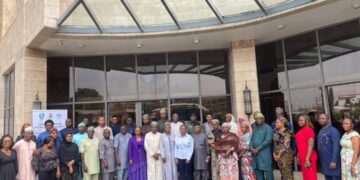By Kehinde Emmanuel
Ilorin – Professor of Business and Entrepreneurship, Muritala Awodun, has decried the depreciating value of the naira and its effects on the standard of living of average Nigerians.
Awodun who stated this in a paper he delivered recently in Ilorin described the development as pathetic , saying that Nigerians deserve better than this.
According to Awodun who is also Director, Centre for Enterprise and Human Capital Development, Crown-Hill University, Eiyenkorin, Kwara State, Nigeria, the country should not be where it is today if its economy is in good hands.
Awodun, who is also the Chief Revenue Consultant to CSDC Consulting Enterprise Solutions and Tree Four Consult, was speaking on the declining value of the naira and attendant implications for Nigeria,its economy and ordinary Nigerians.
“Certainly, we should not be where we are if the economy has been under very good management. But because of poor management of the activities relating to the economy of this country, we are where we are now.
” When you look at it, there is no justifiable explanation or reason that will be given that will convince people like us that in six years, we all watch helplessly as our economy, in terms of the exchange rate, nosedived from about N160/$1 to about N475/$1.
“This is three times worse than it was before. For instance, earning a monthly salary of N475,000.00 in 2015 means you are earning about $3,000 monthly, with the same salary six years down the line today, you are earning $1,000.
“Prices of items you are buying in the market have all gone up more than three times without exception. So, you are worse off than you were six years ago in all ramifications.
“That is something that should make anybody worry, even those in charge of the economy.
“For me as a professional, it is not something that is in the interest of the country that we should be where we are today.
“Unfortunately, we will always find reasons to explain away any situation that man or a nation finds itself.
Even , when as an individual, you know you are the one that has failed to do what you are supposed to have done, you will still want to attribute reasons to why you are there, rather than take responsibility for your actions and inactions.
” If a student failed an examination, for instance, it is not uncommon to hear such a student, rather than taking responsibility for his failure, attributing his failure to his parents who he may accuse of not supporting him enough like other parents, or his teachers who have set very difficult questions, or even his co-students and invigilators for not cooperating in the examination hall.
“At the same time, you will see another child whose parent’s situation is worse than the child in question that failed, and that child from the not-so-good background excelling in his examination despite the harsh condition of life.
” While one accepts his situation and made up his mind to do something to make it better, the other is busy finding faults and passing blames rather than taking up the challenge and making his situation better.
” That is exactly the case of Nigeria. If only we can just take responsibility for our actions and inactions rather than look for excuses, just to justify our failure, then our situation might be better.
“In other words, as a nation, we have failed in the management of the economy of Nigeria. We really have failed.
“All the excuses of things that have happened or not happened are not enough. They are just like passing the buck. We have failed and we have failed.
“What should be of consideration to us all is where do we go from here? The earlier we accept that we have failed, and begin to look at what made us fail and begin to address it, the better for us. I feel very bad because I know that it can be better.”
Awodun, who is a former Chief Executive Officer of Kwara State Internal Revenue Services, said given enormous internally generated revenue (IGR) potential in the country, the Federal Government, 36 states and the Federal Capital Territory Abuja, can survive with internally generated revenue if it is developed, harnessed and well applied.
He noted that every state in the country has enormous IGR potential but lamented that out of the 36 states, one can hardly count up to six states that can survive without federal allocation going by the figures of the internally generated revenue (IGR) of the 36 states of the federation.
According to him, it is not that these other states cannot generate sufficient IGR but because they are solely dependent on the money that comes from the Federal sources which come with little or no effort and because it is barely adequate for them to pay salaries and do some other things, they tend to be contented with that status.
“What if that federal allocations stop today, how are those other states going to survive,? he asked.
Awodun said all the states of the federation and FCT can be self-sustaining if they develop and optimise their resources and IGR collection.
He, however, stated that none of the 36 states in Nigeria and the Federal Capital Territory, (FCT)Abuja, have reached their full potential in internally generated revenue collection.
The tax consultant urged the states and FCT to develop the resources in their domains and optimise their IGR collection for sustainability rather than depend on federal allocations.
“All the 36 states of the Federation, including the FCT have not reached their full potential.
“The six states that are said to be doing well can still do far better based on the revenue potentials of those states. They are being appraised as having done well only compared to where they are coming from.
“The Federal Government, in terms of revenue generation, can do a lot better than what they are doing now, so can all the 36 states.
“Those that are doing well now should be encouraged in that direction so that they will do better.
” The states that are not doing well at all should begin to wake up because without them going in the direction of trying to make the business environment in their states conducive enough to generate economic activities, they cannot significantly drive IGR, and this may not augur well for them in the years ahead.
“There is no state in Nigeria that cannot survive, if left alone. What will happen is that each state will begin to look inward and develop their hidden potential, and before you know it, there will be increase in their IGR.
” The bottom line is, when the chips are down, there is no state that cannot survive on its own, and I stand to be corrected. It is just that they will have to begin to look at things that will make them self-sustaining.
“There is no state that does not have one form of mineral resource or the other, aside from the massive landmass.
” Rather than take the money they are collecting from the federal to go and develop those mineral resources and build industries around them so that there can propel good economic activities in the various states, everybody is just collecting the federal allocation money and spending on recurrent expenditure, which practically is consumption-oriented.
“If each state decides that for every administration that comes onboard, one particular form of mineral resource of their state will be concentrated upon such that industries will be built around them, or concentrate on one form of their agriculture potential and magnified them on a large scale, such states will not be the same again after that particular administration.
“The situation is that most states are not making any significant effort to develop in Nigeria, as they always find a ready excuse every now and then to pass the buck.
“Every state in Nigeria has one form of resource or the other that can actually make that state to survive, but we are not looking at such a direction because we have a source of revenue that is like free money.
“My take is that we should not wait until the situation becomes too late, as the present state of affairs is not sustainable for too long and the warning signals are already out there.” (vitalnews)


















